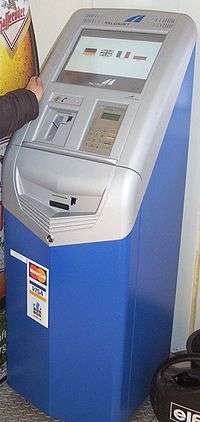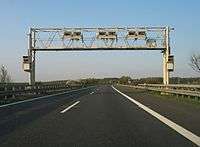Toll Collect
Toll Collect GmbH is a German company that has developed and is running the tolling system for trucks (LKW-Maut) on German motorways.

The company was a consortium led by Daimler AG, Deutsche Telekom, and Cofiroute until 2018 when it was taken over by German Government. It has won a bid for the development of a toll billing system from the German government. The development of the system started in September 2002. The technology is based on the Global Positioning System, and a web application for booking truck routes in advance. Trucks are equipped with embedded systems called "On Board Units" (OBUs). OBUs are used for positioning, monitoring and billing. Additionally the OBUs have infrared interfaces for communicating with stationary control gantries on the motorways.
Since the end of 2002 several hundred engineers and programmers worked on the project. Articles report more than 1000 experts were involved in the project. The rollout was first scheduled for the end of August 2003, but was delayed repeatedly, causing the government to forfeit toll collection on trucks using the Autobahn. The deadline was first shifted by 2 months, then by at least one year. There have been, and still are, considerable disputes between Toll Collect and the German government about damages to be paid by Toll Collect to the Government because of the long delay in the deployment of the system. There were also accusations that during the tender process for the system, non-German companies were not given fair consideration.
The system was opened two years behind schedule on January 1, 2005. The charge per kilometre varies according to the number of axles and the vehicle's emission category and is between 9 and 14 cents per kilometre. This means, that the road tax for e.g. a Hamburg-Munich-trip (776 km) costs between €69.84 and €108.64. It is payable at toll booths if they do not have electronic units that permit automatic billing.
Technical background of the satellite based toll system
Generally, for any truck on German motorways, toll has to be paid, depending on multiple parameters. The toll can be paid by different means. Firstly, a particular route can be pre-booked over the Internet. Secondly, the toll can be paid at terminals (often found in fuel stations). Thirdly, the preferred method is the fully automated billing using On-Board-Units (OBUs) deployed in the trucks, receiving GPS signals. When the truck is started, the OBU localises the vehicle by satellite navigation. Based on the position and the road data stored in the OBU, the device can determine independently the toll regulations for the particular route. The data collected in this manner are transferred to the data center by (land-based) mobile data communication, and processed for billing. Thus the terminology of the system being "satellite based" relates to the positioning only, not to subsequent communication.

To prevent avoidance of toll payments (e.g. by switching off the OBUs), the trucks are photographed at approximately 300 toll enforcement gantries, and checked by approximately 450 mobile checking stations. The data generated from these compliance checks are compared in the central computing system, and enforcement measured being started. The non-compliance rate is published as being constantly less than 1%.[1]
Hopes to export the technology of this system to other countries did not come true, neither did considerations to expand the system to further services, such as fleet management.[2]
See also
References
- Anfrage nach dem Informationsfreiheitsgesetz auf fragdenstaat.de
- Daniel Delhaes (2013), "Völlig verfahrenes Verfahren", Handelsblatt (in German) (48), p. 6, ISSN 0017-7296
External links
- Official Website of Toll Collect
- article on opening
- Road tolls: How will it affect the modal split? Master thesis written by Carlos Braga and Magnus Källgren about Toll Collect and its possible results